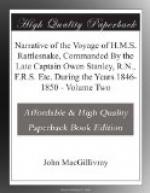November 18.
The natives came and brought some of their gins (women) with them. They would only allow one of us at a time to go near them. The women wore very neatly fringed girdles hanging loose about their loins, and shaded themselves with large fan-palm leaves. The girdles were made of the leaves of the Cordyline. Both men and women were very stout, strong, well-made people—some of the men standing six feet high. They brought us some fish, which they called mingii, but it was such as they would not even eat themselves; also a kind of paste, made of different kinds of leaves and roots, mixed with the inside of the roasted mangrove seeds, all pounded up together, then heated over a fire in a large shell. This paste they call dakiaa.* Although we did not much like the taste of the paste, and it was very full of sand, we ate some of it as a vegetable.
(Footnote. This is identical with the biyu of Cape York. See Volume 2.)
November 19.
This morning about fifty or sixty natives, all strongly armed with spears, made their appearance, and by their gestures and manner it was quite evident they intended to attack us if opportunity offered. As we always kept our firearms in readiness, we stood out in a line, with our guns in our hands. I made signs to them to keep back, but they pretended not to understand us, holding up pieces of fish, crying out mingii, mingii (fish, fish) to induce us to come for them, but their designs upon us were too transparent for that. They kept us standing a good while, for I was anxious to refrain from firing on them if possible, and at length they left us without any actually hostile demonstration. Being Sunday, I read prayers to-day.
November 20.
Taylor died this morning, and we buried him in the evening, by the side of Douglas, and I read the funeral service over him.
November 21.
About sixty natives came to the camp this morning, well armed with spears, and pieces of fish, which they held up to us, to entice us to come to them. We took no notice, however, of their invitations, but preparing our firearms, we turned out. They were now closing round us in all directions, many of them with their spears in their throwing-sticks, ready for use—pointing them to their own necks and sides, and showing us by their postures how we should writhe with pain when they struck us. Then they would change their tactics and again endeavour to persuade us that they meant us no harm, but they would not lay down their spears. Some of them seemed inclined to go away, but others appeared determined to attack us. After keeping us standing about an hour, eleven spears were thrown at us. Three of my party then fired, slightly wounding one of them, when they all immediately ran away as fast as they could. Some of them, however, remained hovering in sight for some time after. Three of the spears that were thrown fell short of us, the rest passing very close, but fortunately no one was hurt; the three spears which passed us were barbed with bone, and were very heavy.




